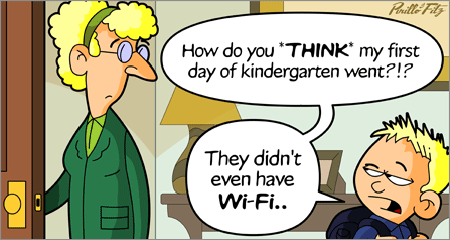Last week, I wrote about how apparently using Times New Roman on your résumé may signal you are out of touch.
When you are searching for work, it seems that you now have to be concerned with whether you are a “digital native” as well. If you’ve recently seen this term on a job description, it’s just the latest ploy to cleverly mask age discrimination according to recent articles in Fortune and The Wall Street Journal.
What does “digital native” even mean?
The term was created by author Marc Prensky, when he compared digital natives to digital immigrants in a 2001 article. He describes digital natives as those who grew up as “native speakers,” using the digital language of computers, video games and the Internet, while digital immigrants are everyone else — those not born into the digital world but who have adapted.
If you prefer your emails to be printed out, or if you have ever called someone to see if they received your email, Prensky says odds are good that you are a digital immigrant. You may adapt with changing technologies, but there will still be lingering “accents” or remnants of the old way of doing things which will reveal your true identity from time to time.
Why should digital immigrants be embarrassed when their “accents” surface, and why is the ubiquitous use of this term a troubling move when it comes to hiring practices? Since Mark Zuckerberg’s cocky “young people are just smarter” quote and as more companies have been immersing themselves in all things digital, age discrimination complaints have grown by about one-third in the last 20 years.
I respectfully disagree with both Pensky (that adapting to technology comes as a “struggle” to all “older people”) and with Zuckerberg (that younger people are always “smarter”). I, for one, seem to be in the generation between natives and immigrants, and I have personally seen digital immigrants embrace technology and better master certain aspects of it than myself or even digital natives I have worked alongside.
Are our workplaces not better for the experiences that a variety of ages and backgrounds can bring to the table? Are we not able to service clients better when we take a multi-dimensional staffing approach to include both digital natives and immigrants? Certainly, as creators of digital content, it is important to master all sorts of digital delivery devices and mediums including social media. But it stands to reason that life experience, mutual respect for one another, awareness of social norms and common courtesy (which The Social Network movie so eloquently highlighted the absence of with Zuckerberg’s generation) should still have a valued seat at that same table.
At Shift Key, we make communication capital. We are journalists who know how to create original content, the foundational layer of digital marketing. We understand audience and the information your audience wants — whether you are an agency, brand, company or non-profit. Content is the bedrock of digital marketing. Shift Key creates unique and informative content that feeds marketing activities across a mounting number of channels, generating buzz for brands and leads for products and services.
Pictured: Pirillo & Fitz cartoon

